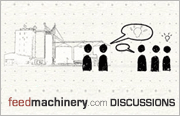By Peter Shinn
BROWNFIELD
09/02/2007
A key question related to the most recent Canadian case of bovine spongiform encephalopathy (BSE), the animal's age appears to have an answer. Wednesday, when the Canadian Food Inspection Agency (CFIA) announced that a bull in Alberta had tested positive for BSE, it described the animal simply as "mature."
The age is important, because Canada implemented a ruminant-to-ruminant feed ban in August of 1997, which is supposed to control the spread of BSE if put in place properly. BSE-positive cattle born after the feed ban went into place call into question the effectiveness of Canada's efforts to eradicate the disease.
Dr. George Luterbach, Senior Veterinarian for the Canadian Food Inspection Agency, told Brownfield Friday he believes the most recent Canadian case of BSE was born after Canada implemented a ruminant-to-ruminant feed ban, based on the report of cattleman who had owned the animal in question.
"The owner reported the year of birth as being 2000," Luterbach said.
Luterbach said, if confirmed, that would be Canada's third case of BSE found after their feed ban took effect. But he pointed out the information on the animal's age hasn't yet been proven by the ongoing investigation into the case.
"Much of this information needs to be verified," cautioned Luterbach.
Even if the latest case of Canadian BSE was born after Canada's feed ban went into place, Luterbach said that doesn't mean the prohibition on ruminant-to-ruminant feeding isn't working.
"Most countries that have had BSE have experienced a small number of cases after the feed ban implementation," he said.
Nevertheless, Luterbach confirmed Canada had approved new rules that would remove meat and bone meal from all livestock feed, including that destined for swine and poultry, effective on a mandatory basis in July of this year. He cited accidental feeding of swine or poultry feed containing meat and bone meal to cattle as one potential pathway for BSE transmission, and said Canada wished to eliminate that possibility.
"As an enhancement to what I believe to be a largely effective feed ban, Canada is moving ahead to remove all SRM [specified risk materials] from all feed in Canada," Luterbach explained, "thus removing more than 99% of the infectivity, should it be present in feed."
As for the charge of American cattle group R-CALF USDA that there's an epidemic of BSE in Canada, Luterbach called that "nonsense," pointing out Canada has a "robust surveillance program" and arguing that BSE in Canada is "well on its way to eradication." Luterbach also asserted that Canada had taken every step suggested by science for dealing with BSE.
"BSE control and eradication is not just factored on one single event," Luterbach said, "but rather, it is a whole suite of measures that are in place."
Nine head of cattle have turned up positive for BSE within Canada's borders. One other case, America's first, involved an older dairy cow imported from Canada. Two other cases of BSE have since been found in the U.S., both involving animals born before the U.S. implemented its ruminant-to-ruminant feed ban.


